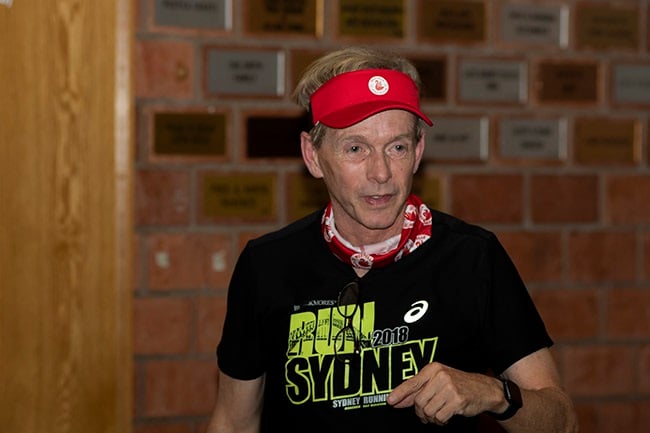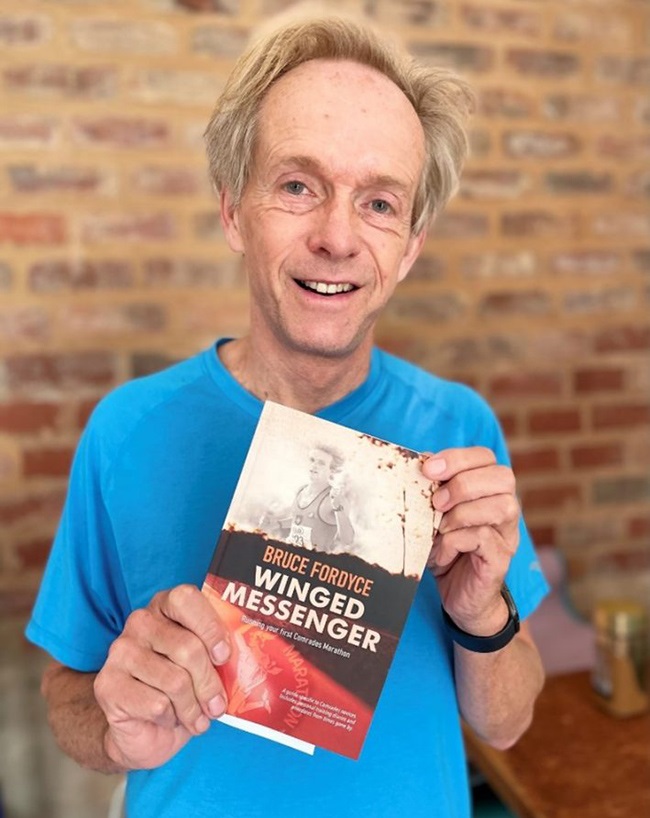
Bruce Fordyce. (Photo by Gallo Images/Darren Stewart)
- Nine-time Comrades Marathon winner Bruce Fordyce talks about his latest book offering: Winged Messenger and why he decided to focus on a guide specific to Comrades novices.
- The Parkrun Southern Africa CEO discusses the toll the pandemic has taken on people’s mental health and slams “so-called scandalous solutions” that are “bordering on criminal.”
- The 65-year-old athletic legend, who estimates to have run 210,000 km, also shares his views on Wayde van Niekerk’s comeback and whether Eliud Kipchoge is the greatest ever.
Sport24 asked: What inspired your latest book: Winged Messenger?
Bruce Fordyce: It was not entirely a lockdown project because writing a book for novices about attempting their first Comrades Marathon has been at the back of my mind for a long time. However, the severe Lockdown Level 5 which we were held at afforded me the opportunity to finally get it done because I think I had written about 500 words in two years! The silver lining in the lockdown cloud for me was Winger Messenger. In terms of sales, the book is doing unbelievably well and I’m overjoyed. I was very frightened to have it published because when you write something you are bearing your soul and putting yourself out there to be hammered. But the feedback has been so positive. I’ve been stopped by so many people who say, “Please write another one – we loved it,” while novice runners have remarked, “Thank you, you have made me understand that you can still have a life while you train for Comrades.” My biggest source of sales and the most fun I’ve had has been to go to running clubs. I give a 10 minute talk about the book and then take questions for 30 minutes about how to train for Comrades. At the end, I land up singing books and selling them. I’ve had to postpone five running club gatherings owing to Level Three Lockdown and the current third wave of the pandemic but I am aiming to resume my talks at running clubs from August/September.
Sport24 asked: As an ex-athlete, how did you cope with lockdown?
Bruce Fordyce: I was very determined and got through the severe lockdown but no one will ever do that to me again! I had to run 54 laps in my garden to get a 5km. I’m not a Covid denialist – it is dreadful and I have lost some friends and colleagues – but the so-called solutions to it are absolutely scandalous and in fact bordering on criminal. Millions of people have lost their jobs, they have been plunged into depression and other more serious diseases have been disregarded. As the founder and CEO of Parkrun Southern Africa this has been the most frustrating year of my life. Up until recently we hadn’t had a Parkrun and have only just managed to start some very small ones that are far away from the big city centres. It’s really frustrating because we know from the science that you have almost zero chance of catching Covid-19 in an outdoor fresh air environment. Owing to the benefits of Parkrun in terms of mental health and community development, I believe we should have been allowed to start already but obviously we can’t. I think we are getting closer and it will be wonderful to see Parkrun back again.
Sport24 asked: What factors led to your Comrades Marathon success?
Bruce Fordyce: Aside from good genetics – having chosen my parents correctly – I had a very effective training approach to Comrades which worked. Once I had worked out the formula, I didn’t tinker with it too much. I would only make the odd change here and there depending if it was an up-run or down-run. If you’re a chef you put the same ingredients in at the same temperature in the oven and you get the same delicious meal. The self-same analogy should apply to running but what happens is, when people do well in the Comrades they sometimes double their mileage. They think to themselves, “I’m going to do twice as much as I did last year and then I’ll have twice as much success.” But guess what? They don’t and have twice as much failure owing to injury, sickness or race-day exhaustion…. In 1977, I had no idea I would win Comrades one day but in the book I detail the beginnings of my approach to the race which worked. In that first run I got a very solid silver medal which I was over the moon about. I had now already begun to germinate the ideas that would be necessary to win Comrades. If you told me on my first 10 minute run around the Wits rugby fields, “Bruce, one day you will win Comrades.” I would have said, “Wow, I’ll take that!” But if you said, “One day you will win your ninth,” I would have replied, “Now you’re smoking something.” As Tim Noakes writes in the foreword, winning the Comrades Marathon nine times is not impossible because I’ve done it. It is possible but it’s very tough and is becoming increasingly more difficult now.
Sport24 asked: Has cheating been rife within the world of Comrades?
Bruce Fordyce: I don’t think doping is endemic to the Comrades Marathon. In the past, we have had a couple of instances of drug failures but not many. Doping is terribly sad but it is prevalent in every sport and we just have to fight it as hard as we can and strive towards clean sport. I think Comrades might have missed the odd person who doped here and there but there have been some runners caught at Comrades as well. Aside from doping, there have been other forms of cheating. I remember poor old Herman Matthee who took a ride in a taxi in 1993 and joined the race 30km from the finish. I also recall when the Motsoeneng twins switched out during the 1999 race. They made the classic error when swapping running tops in the mobile toilet. They wore their watches on opposite wrists. There are those instances but if I had cheated I would never have been able to look myself in the mirror. When I think about winning nine times, the one thing I know about it is that I raced against some of the world’s best runners and I won fairly. I am proud of myself for that achievement. The Comrades – in its centenary – oozes integrity and it’s a deep and grievous insult to the race to cheat because in a sense you are belittling all the ordinary runners who take 11-12 hours to get to the finish. You’re part of an incredible race with a great history and tradition so why cheat?
Sport24 asked: Is Eliud Kipchoge the best modern day marathoner?
Bruce Fordyce: I have been around for a long time so I have seen that title attached to many great marathon runners but, in the case of Kipchoge, I think it is probably the correct description. He is a Kenyan from exactly the right part of the Rift Valley. He boasts an unbelievable running style coupled with his supreme genetics. He also possesses the head, the confidence and has a brilliant training programme in place. He lives at high altitude, eats a simple diet and does plenty of training. His achievement of a sub-two hour 42km in 2019 was just amazing. My personal best is 2:17 and I cannot believe somebody would beat me by more than 17 minutes because I know how fast I ran that day. The special marathon event in Austria was a gimmick but it was still wonderful to see it done. I loved watching it and was very emotional when I realised that with 5km to go he was going to set the record… If Kipchoge were to absolutely put the argument to bed in terms of being the greatest modern day marathoner, he needs to win a second Olympic gold in Tokyo. And then I would say the only other thing missing from his CV is a Boston Marathon title. He hasn’t won the world’s oldest and most famous marathon. That said, even if the 36-year-old doesn’t win another Olympic gold medal and never partakes in the Boston Marathon, he will probably still go down as the greatest ever… I ran dozens and dozens of marathons so by the time I hit 1990 as a 35-year-old runner I had been in the proverbial boxing ring too many times. But Kipchoge still has time on his side. He started off as a 5 000 and 10 000 metre runner where he earned World Championship medals. Only then did he move up to the marathon. A such, he is still relatively fresh and probably has a couple more great performances left in him but not too many. Then it will be over for him too.
Sport24 asked: Your take on Wayde van Niekerk’s comeback?
Bruce Fordyce: I’m holding thumbs for Wayde and hope he can do it (at the Tokyo Olympics) but it’s hard to maintain the highest level as a 400m athlete. Thinking back to his 43:03 at the 2016 Rio Olympics was absolutely sublime. That’s the only word for it because he did it in the worst possible lane. To be in Lane 8 where he couldn’t see any of his competitors was a huge disadvantage. I have massive respect for the 400m runners because it is a flat-out sprint. Unfortunately at the point where your body would want you to stop sprinting – the 300m mark – you have to keep going for the next 100m. They call the 400m hurdles the ‘man killers’ because they are very tough races. 400m runners, like sprinters, don’t last too many Olympics. The demands of the sport along with the wear and tear on the body takes its toll. I say to people I had a successful running career because I didn’t sustain too many injuries. The key thing to do is find out your own biomechanics. Wayde’s biomechanics will be different to mine. Mine are that I pronate very heavily on both feet and if I looked after that issue I stayed relatively injury-free. Now my knee is dodgy but what can you expect at the age of 65 and having run more than 200,000 km? In terms of Wayde, I hope he can still excel.
Sport24 asked: What is the biggest regret you have in life?
Bruce Fordyce: I have had very few regrets in life but my deepest regret is that I never learnt to play a musical instrument. I love listening to music and I can play the meanest air guitar you have ever seen in your life! I know that people say it’s never too late to learn but I wouldn’t want to just be good because that’s the competitive side of me coming out. I would want to be brilliant at playing guitar. So if you were to say, “Play the guitar, Bruce!” I’d want to be Jimmy Page from Led Zeppelin.
In Winged Messenger, available at leading book stores and online, Fordyce shares his 1976/77 training diary for novice runners to follow the journey he took to his first Comrades. It offers a rare glimpse into a young man’s journey to conquer both himself and South Africa’s most iconic race.
Previous chats:
Eddie Andrews
Raymond Rhule
Robert Hunt
Dean Hall
Nicolaas Janse van Rensburg
Jasper Wiese
William Small-Smith
Matthew Booth
Boebie Solomons
Chris van Zyl
Wim Visser
Morgan Newman
Dewald Potgieter
Daniel Leo
Tera Mtembu
Heyneke Meyer
Ernst Joubert

